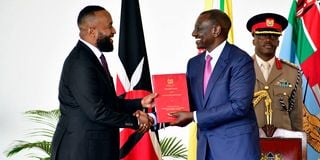
President William Ruto (right) with Ministry of Mining, Blue Economy and Maritime Affairs Cabinet Secretary Hassan Ali Joho at State House, Nairobi, on November 19, 2024.
Before Mining Cabinet Secretary Hassan Joho’s recent rants against vocal social media users, President William Ruto had on at least two separate events in recent weeks singled out Kenya’s vibrant online community for its notoriety.
Despite riding on the digital wave to win power in 2013 and 2017 — including controversially using consultants from the disgraced Cambridge Analytica to influence voters online —President Uhuru Kenyatta and his then Deputy President William Ruto would later have critical comments whenever social media users, particularly those known as Kenyans on Twitter (KOT) turned against them.
Influential social media users were regularly arrested and charged under controversial provisions like computer misuse and cybercrime, only often to be rescued by the courts, which had in 2020 declared the law unconstitutional before other amendments were made in subsequent reviews.
So bad was the situation that President Kenyatta eventually quietly disabled his Twitter (now X) and other social media accounts in June 2020 to avoid the “direct feedback” he was receiving.
Dr Ruto and his Kenya Kwanza brigade would similarly heavily rely on social media to augment the countrywide ‘ground’ tours, following their complaints that the mainstream media was biased against them.
Ascended to power
It is a strategy they continued with even after they ascended to power. But things quickly took a different turn after the Kenya Kwanza administration started implementing its policies, including increased taxes, that some considered oppressive.
Mid this year, the young people, who were previously ridiculed as keyboard warriors, used the power of social media mobilisation (especially on TikTok and X) to organise nationwide protests that shook Dr Ruto’s administration to its core and forced him to not only withdraw the Finance Act 2024 but also reconstitute his Cabinet. Since the historic protests by Gen Z began in mid-June against the Finance Bill's contentious tax provisions, internet activism is heavily monitored and social media activists face harassment, surveillance and abductions. The anger spilled over to the streets.
President Ruto had escalated the anger against social media dissent this week calling it an outbreak of “evil spirits”, which he said was out to oppose everything his government did.
Mr Joho picked a cue from his boss, calling for social media regulation.
“This country cannot be run on social media. A country can really not be run like that; if you are shouting on social media, you are becoming unpatriotic,” Mr Joho said in Voi, speaking in a mix of Kiswahili and English
The sentiments were echoed by both MP Junet Mohammed and President William Ruto with whom they were in Voi on Tuesday for the official unveiling of the Devki Iron Processing Plant.
Some of the most vocal critics of the government on social media have been targeted for abduction by people believed to be security officials—with some of them taken to court while others released after days without charge. The discontent has continued apace on social media – from leaking documents alleging impropriety in government projects or trumpeting nicknames and sharing cartoons with the likeness of top officials to expressing strong views on various plans.
“While rude, pejorative, and savage social media posts have been all the rage recently, threatening Kenyan citizens from commenting on governance and development progress fundamentally attacks the freedom of expression guaranteed under our laws,” says Amnesty International Kenya Executive Director Irũngũ Houghton.
Current tensions
He adds that the Kenyan state needs to recognise that the current tensions arising from deep concerns, corruption and bad governance have not been rooted out.
Amnesty International Kenya and others have been advocating for greater self-regulation by social media platforms for over six years.
According to Wanjiru Gikonyo, an activist, social media as a tool for public participation has a formal role and a government such as Kenya, which is required by the constitution to respect the freedom of expression and various rights, ought to have formal mechanisms for tapping social media feedback into government policy-making “beyond the email because presently, it is just the email.”
In progressive states, “you can do a whole policy discourse on social media alone,” she said.
“The government should be reading the public mood. But beyond reading the public mood, the government is not listening to Kenyans.” However, she says, the Ruto administration is tone deaf and “is on a different path with Kenyans because they have violated their election promises and are instead operating like a criminal enterprise.”
The arrests, the killings, intimidations, harassments, imprisonments, injury and deaths, cracking down on protests, are all targeting freedom of civic space, says lawyer Morara Omoke.
“Freedom of expression and the use of social media, and graffiti and generally just criticising the government and giving views do not amount to the kind of expression that should be limited or restrained,” said Mr Omoke.
But government spokesperson Isaac Mwaura disagrees.
“The expressions are meant to emphasise direct engagement with the people at the grassroots level as the most effective means of communication. This is how we won the elections so we are going to be engaging this way to drive the message home. Social media has its place, but the ground is the surest way to gauge public opinion,” Mr Mwaura said.
US-based lecturer and political analyst, Prof David Monda, says threats by government officials show a government beleaguered by critics.
“It also shows the coercive face of the Kenya Kwanza administration looking to intimidate its opponents into silence. The government not only faces pressure from critics on social media, but from the church rejecting alms from state officers and opposition forces realigning in light of the impeachment of DP Gachagua,” says Prof Monda.









